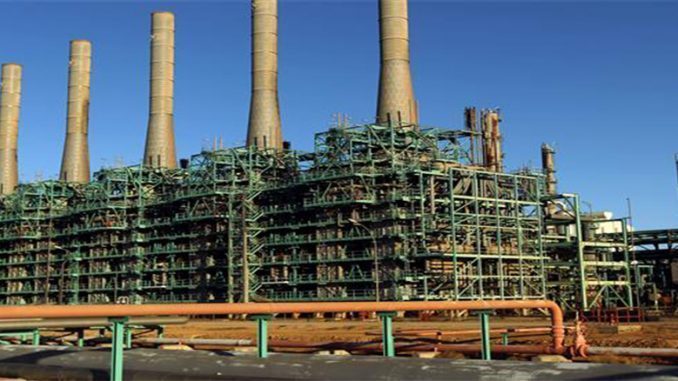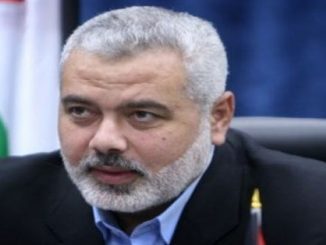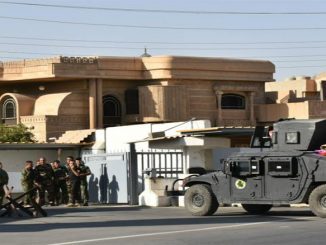
Two employees of the National Oil Corporation and two attackers reported dead after several blasts heard in Tripoli
An assault on the headquarters of Libya’s state oil firm, the National Oil Corporation (NOC), has left two security guards and two attackers dead, according to a security official.
Monday’s attack on the landmark building in Tripoli, the nation’s capital, comes just a week after the UN negotiated a truce between rival factions fighting for greater control of the capital.

Forces linked to the Tripoli government published pictures of a human leg, which it said belonged to one of the gunmen who had blown himself up.
Libya’s health ministry said that in addition to the deaths, 10 people had been wounded.
“The death toll so far is two killed from NOC staff and two attackers,” said Ahmad Ben Salim, spokesman for the Special Deterrence Force (Rada), a militia that operates as Tripoli’s police force, which had surrounded the NOC building.
Ben Salem said “the situation is under control” and that the remains of two “suicide bombers” were found inside the building.
They were discovered on the second and third floors, he said, while identifying the two people killed in the assault as security guards.
Tripoli security chief Salah al-Semoui blamed the Islamic State group for the attack, although there was no immediate claim of responsibility.
Fighters loyal to the Islamic State group have previously carried out attacks in Tripoli and other Libyan towns and cities.
The UN Support Mission in Libya denounced a “cowardly terrorist attack,” calling it in a statement a “blow against Libyans everywhere”.
Ben Salem was not able to provide details on the identity of the attackers but the Special Deterrence Force also labelled the incident a “terrorist” attack.
NOC chairman Mustafa Sanallah, who was safely evacuated from the headquarters, told the news channel Libya 218 that staff members had been killed and others wounded, some of whom were in a “serious condition”.
Several armed men were reported to have attacked the headquarters on Monday morning, with a series of blasts heard before ambulances carried wounded people away, a Reuters witness said.

“Three or five gunmen were shooting inside the building,” an NOC staff member earlier told the Reuters news agency after he said he had jumped out of a window to escape. “Several people were shot.”
The NOC building is covered mainly in glass, and a witness said several people had been wounded by shattered windows.
Security forces were smashing windows so staff could escape, witnesses said.
Libya has been divided between rival governments and military factions based in the east and west of the country since 2014, causing political deadlock and an economic crisis.
However, the NOC has continued to function relatively normally across Libya, which relies on oil exports for most of its income.
Oil production has been hit by attacks on oil facilities and blockades, though last year it partially recovered to around one million barrels per day.
UN brokers ceasefire to end clashes in Libya’s Tripoli
Fighting in and around Tripoli since 27 August has killed at least 50 people and wounded 138 others, most of them civilians
The UN mission in Libya said it brokered a ceasefire on Tuesday to end a week of clashes in the capital Tripoli that have killed dozens and forced thousands to flee their homes.
Fighting in and around Tripoli since 27 August has killed at least 50 people and wounded 138 others, most of them civilians, according to the Libyan health ministry.
The violence has also forced thousands of people to escape to nearby towns or seek shelter in other districts of the capital, while many more have remained trapped inside their homes.
“Under the auspices of (UN envoy Ghassan Salame), a ceasefire agreement was reached and signed today to end all hostilities, protect civilians, safeguard public and private property,” the UNSMIL mission said.
Following another day of violent clashes in the capital’s southern suburbs, the fighting came to a pause in the early evening but it was unclear if all of the groups involved would respect the agreement.
A ceasefire deal announced on Friday by officials from western cities was only held for a few hours.
After that, UNSMIL invited the “various Libyan parties” to Tuesday talks for an “urgent dialogue on the current security situation in Tripoli”.
The UN mission announced the ceasefire hours later on Twitter.
It said the agreement also provided for the reopening of Mitiga, the capital’s only functioning airport that has been closed since 31 August due to the clashes.
The agreement “today does not aim to fix all the Libyan capital’s security problems; it seeks to agree on a broader framework on the way to start addressing these issues,” it added.
The UN mission said among those who took part in the closed-door talks were military officers and leaders of various armed groups present in and around the capital.
Representatives of the UN-backed Government of National Accord (GNA), including the interior minister, also attended the talks.
The Libyan capital has been at the centre of a battle for influence between armed groups since the fall of longtime and autocratic leader Muammar Gaddafi in 2011.
The fighting has pitted armed groups from Tarhuna and Misrata against other militias from Tripoli supposed to be under the GNA’s control.
Migrants in Tripoli after being relocated from government-run detention centres in Tripoli (Reuters)
The GNA, which has been unable to form a functioning army or regular security forces, has been forced to rely on such militias to keep Tripoli safe.
Most of the militias formed the backbone of the NATO-backed uprising that toppled Gaddafi.
Since then, rival administrations, including one based in the remote east, and the militias have competed for authority and oil wealth in the North African country.
The UN-backed government said on Tuesday the violence had forced 1,825 families to flee to nearby towns or seek shelter elsewhere in Tripoli.
But many more remained trapped inside their homes and some refused to leave, fearing their property could be looted, said the ministry for displaced people’s affairs.
These families had an urgent need for food and water, it said, adding rescuers who had tried to assist them have come under attack from unidentified assailants who also stole ambulances.
The UN rights office expressed concern about the impact on vulnerable people, including migrants.
“Some of the nearly 8,000 arbitrarily detained migrants are trapped in detention centres in areas where fighting has been taking place, without access to food or medical treatment,” said spokeswoman Elizabeth Throssel.
Libya is a major departure point for migrants crossing the Mediterranean Sea to Europe, mainly from other parts of Africa.
In a sign of the chaos, hundreds of African migrants escaped from a detention centre caught in the middle of a shootout, an aid official said.
A video posted on social media purported to show hundreds of Africans, some carrying plastic bags, walking in a long line away from the detention center.
As many as 1,900 migrants had been in the detention center but some were brought by authorities to another facility, a UN official said.




